Introduction
Frogs are fascinating creatures with an important role in our ecosystems, primarily due to their insect-rich diets. Among their preferred prey, mosquitoes stand out, especially given the nuisance and health risks these insects pose to humans.
But do frogs eat mosquitoes regularly? Understanding the feeding habits of frogs and their impact on mosquito populations can offer valuable insights into how these amphibians help maintain ecological balance.
This article will explore the intricate relationship between frogs and mosquitoes, diving into various frog species and how they contribute to controlling mosquito populations.
Key Takeaways
- Frogs Are Natural Mosquito Predators: Frogs play a significant role in controlling mosquito populations by consuming both adult mosquitoes and their larvae, helping to reduce the spread of mosquito-borne diseases.
- Mosquitoes Are Part of a Frog’s Diet: While frogs do not exclusively eat mosquitoes, they frequently include them in their diet, especially in environments where mosquitoes are abundant.
- Variety Among Frog Species: Different species of frogs, such as green tree frogs, leopard frogs, and Cuban tree frogs, have varying levels of effectiveness in preying on mosquitoes, depending on their habitat and hunting methods.
- Nutritional Benefits: Mosquitoes provide frogs with essential nutrients like protein and fats, which are crucial for their growth, development, and overall health.
- Frogs Contribute to Ecological Balance: By consuming mosquitoes and other insects, frogs help maintain the ecological balance in their habitats, making them important players in natural pest control.
Do Frogs Eat Mosquitoes?
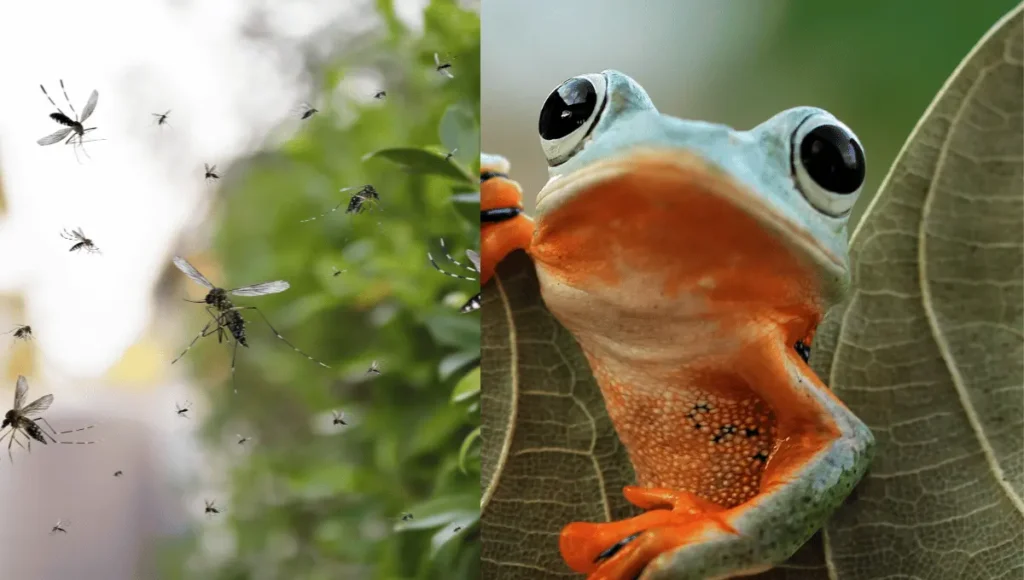
Frogs as Natural Mosquito Predators
Frogs, with their quick reflexes and sticky tongues, are well-suited for catching fast-moving insects like mosquitoes.
Most species of frogs are insectivores, meaning they primarily consume insects, and mosquitoes are often part of their diet.
Frogs rely on movement to detect prey, and the erratic flying pattern of mosquitoes makes them an ideal target.
Impact of Frogs on Mosquito Populations
Different species of frogs may have varying degrees of success in catching mosquitoes, depending on their size, habitat, and hunting methods. While smaller frogs might target mosquito adults, larger frogs can also consume larvae.
The presence of frogs in an area can significantly reduce the mosquito population, which is beneficial for controlling the spread of diseases like malaria and dengue fever.
Frogs’ Broader Dietary Habits
Frogs do not exclusively eat mosquitoes but include them as part of a broader diet that also features flies, moths, and other insects.
However, in environments where mosquitoes are abundant, they can become a primary food source for frogs, contributing significantly to natural pest control.
Nutritional Value of Mosquitoes for Frogs
| Nutrient | Approximate Contribution from Mosquitoes | Importance for Frogs |
| Protein | High (due to the muscle and tissue content) | Essential for growth, repair, and development |
| Fats | Moderate (mostly from the mosquito’s body fat) | Provides energy and supports cellular functions |
| Carbohydrates | Low (minimal carbohydrate content) | Minor energy source, not a primary need for frogs |
| Vitamins | Trace amounts (e.g., Vitamin A from carotenoids) | Supports immune function and overall health |
| Minerals | Trace amounts (e.g., Calcium, Iron) | Important for bone health and metabolic processes |
| Water Content | High (mosquitoes have a high water content) | Hydration, which is crucial for amphibians |
This table provides a general overview of the nutritional benefits that frogs might gain from eating mosquitoes, emphasizing the importance of protein and fats as key nutrients for their survival and health.
Are Frogs Likely to Eat Mosquitoes?
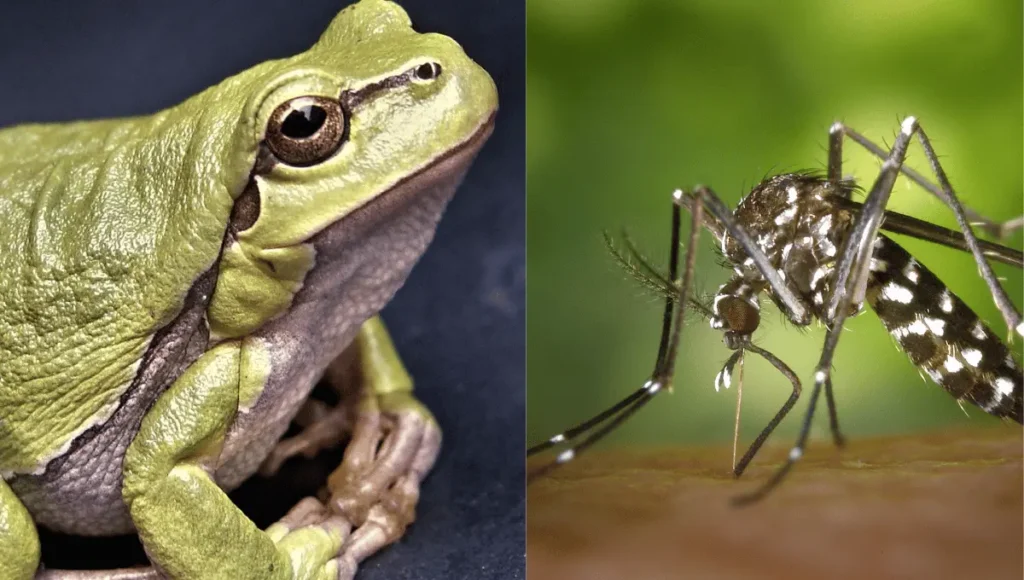
Frogs are opportunistic feeders, meaning they tend to eat whatever prey is available and fit within their dietary needs. Mosquitoes, with their small size and abundant presence in many environments, often fall into this category.
While frogs don’t specifically seek out mosquitoes as their primary food source, they do consume them regularly, especially when these insects are plentiful.
Frogs are naturally inclined to eat small, flying insects because of their quick reflexes and sticky tongues, which are perfectly adapted to catching fast-moving prey like mosquitoes.
The movement of mosquitoes attracts frogs, triggering their predatory instincts. Although mosquitoes are not the only insects in a frog’s diet, they are a convenient and easy target, especially for smaller frog species that may not be able to tackle larger prey.
In environments where mosquitoes are abundant, frogs will likely consume more of them, taking advantage of the readily available food source.
However, their diet remains varied, and mosquitoes are just one part of the broader spectrum of insects they consume. Thus, while frogs are likely to eat mosquitoes, it is more out of convenience and opportunity than a specific preference.
Do Frogs Eat Mosquito Eggs?
Accessibility of Mosquito Eggs to Frogs
Mosquito eggs are typically laid on the surface of stagnant water, where they are not as accessible to frogs as adult mosquitoes or larvae. While frogs primarily consume moving prey, some species might ingest mosquito eggs if they come across them accidentally while feeding on other aquatic organisms.
Other Predators of Mosquito Eggs
However, it is not common for frogs to actively seek out mosquito eggs. Instead, other aquatic animals, such as fish and certain types of beetles, are more likely to feed on mosquito eggs, playing a complementary role in controlling mosquito populations.
Role of Frogs in Mosquito Control
The consumption of mosquito eggs by frogs, although possible, is not a significant factor in their diet. Frogs contribute more effectively to mosquito control by targeting larvae and adult mosquitoes.
Do Frogs Eat Mosquito Larvae?
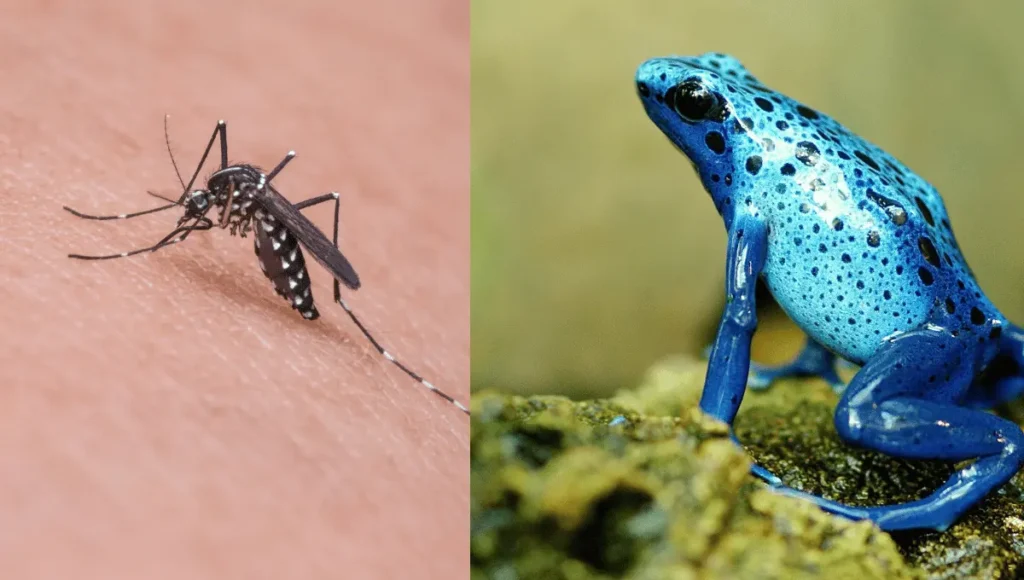
Frogs and Mosquito Larvae in Aquatic Environments
Mosquito larvae are aquatic and can be found wriggling just below the surface of stagnant water. Frogs, particularly those that live in or near water bodies, can consume these larvae.
Tadpoles, the larval stage of frogs, primarily feed on algae and plant matter, but as they grow and transition into adult frogs, their diet shifts towards insects, including mosquito larvae.
Effectiveness of Frogs in Consuming Larvae
Frogs that reside in wetlands, ponds, and marshes are more likely to encounter and eat mosquito larvae. Their ability to consume larvae contributes significantly to controlling mosquito populations before they develop into adults.
By preying on larvae, frogs help reduce the number of mosquitoes that emerge into adulthood, thereby decreasing the potential for these pests to spread diseases.
How Many Mosquitoes Do Frogs Eat?
Factors Influencing Mosquito Consumption
The number of mosquitoes a frog can eat depends on several factors, including the frog’s species, size, age, and the availability of mosquitoes.
On average, a single frog can consume hundreds of mosquitoes in a single night, especially in areas where mosquitoes are abundant. Larger frogs have a bigger appetite and can eat more mosquitoes compared to smaller ones.
Seasonal Variation in Mosquito Consumption
The consumption rate also varies with the seasons; during warmer months, when mosquito populations are at their peak, frogs tend to eat more.
However, it’s essential to note that mosquitoes are just one part of a frog’s diet, and their consumption rate is influenced by the availability of other prey items.
Estimated Mosquito Consumption by Frog Species
| Frog Species | Mosquitoes Consumed Per Night |
| Green Tree Frog | 100-200 |
| Leopard Frog | 150-300 |
| Coqui Frog | 50-150 |
| Cuban Tree Frog | 200-400 |
This table provides a general estimate of the number of mosquitoes that different frog species might consume in a single night. These numbers can vary depending on environmental conditions and the specific behaviors of individual frogs.
Do Poison Dart Frogs Eat Mosquitoes?
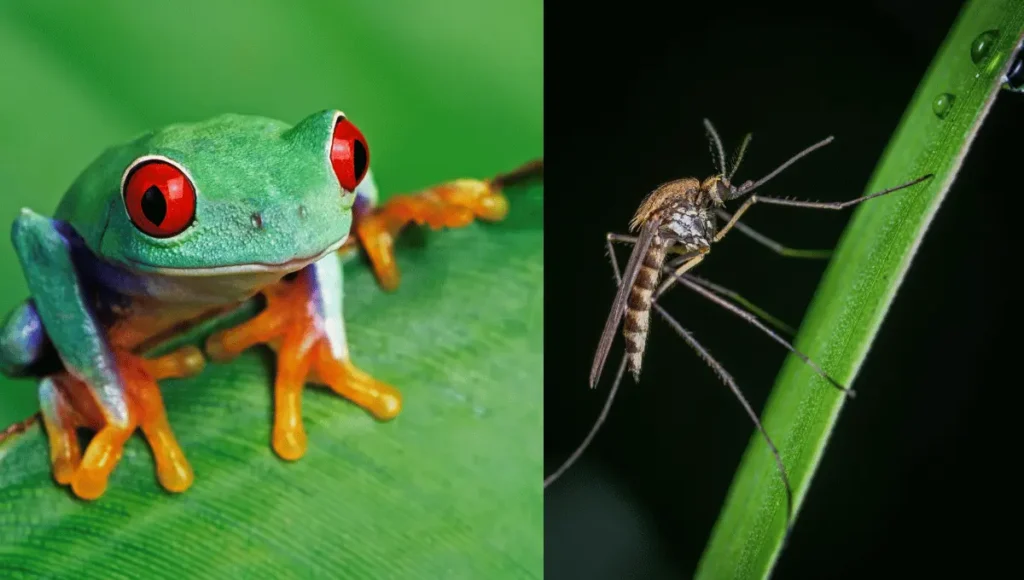
Diet of Poison Dart Frogs
Poison dart frogs are known for their vibrant colors and toxic skin, which serve as a defense mechanism against predators.
These frogs primarily inhabit tropical rainforests, where their diet consists mostly of small insects like ants, termites, and beetles. While poison dart frogs might eat mosquitoes occasionally, mosquitoes do not make up a significant portion of their diet.
Poison Dart Frogs’ Impact on Mosquito Populations
The diet of poison dart frogs is heavily influenced by the availability of prey in their environment. Since they are small and have specific dietary needs, they tend to consume insects that are abundant in their habitat rather than actively hunting mosquitoes. Therefore, while they may contribute to mosquito control in a minor way, their impact is relatively limited compared to other frog species.
Do Leopard Frogs Eat Mosquitoes?
Leopard Frogs as Generalist Predators
Leopard frogs are commonly found in North America and are known for their distinctive spots, which resemble a leopard’s pattern.
These frogs are more generalist in their diet, feeding on a wide range of insects, including mosquitoes.
They are particularly effective at controlling mosquito populations in wetland areas, where mosquitoes are most prevalent.
Effectiveness of Leopard Frogs in Mosquito Control
Leopard frogs are active hunters and can consume large numbers of mosquitoes, both in their adult and larval stages.
Their strong legs and quick reflexes allow them to catch flying insects efficiently, making them valuable allies in natural pest control.
In addition to mosquitoes, leopard frogs also eat flies, beetles, and other small invertebrates, contributing to the overall health of the ecosystem.
Do Coqui Frogs Eat Mosquitoes?
Diet and Feeding Behavior of Coqui Frogs
Coqui frogs, native to Puerto Rico, have become invasive in some regions like Hawaii. These small frogs are known for their loud, distinctive calls, and they primarily feed on a variety of small insects, including mosquitoes.
Coqui frogs are nocturnal, which aligns with the active hours of mosquitoes, making them effective predators of these pests.
Impact of Coqui Frogs on Local Ecosystems
In regions where coqui frogs have been introduced, they have been observed to contribute to the reduction of local mosquito populations.
However, their invasive status also means they can disrupt local ecosystems by outcompeting native species. Despite this, their ability to consume mosquitoes provides some ecological benefits, particularly in areas where mosquito-borne diseases are a concern.
Do Green Tree Frogs Eat Mosquitoes?
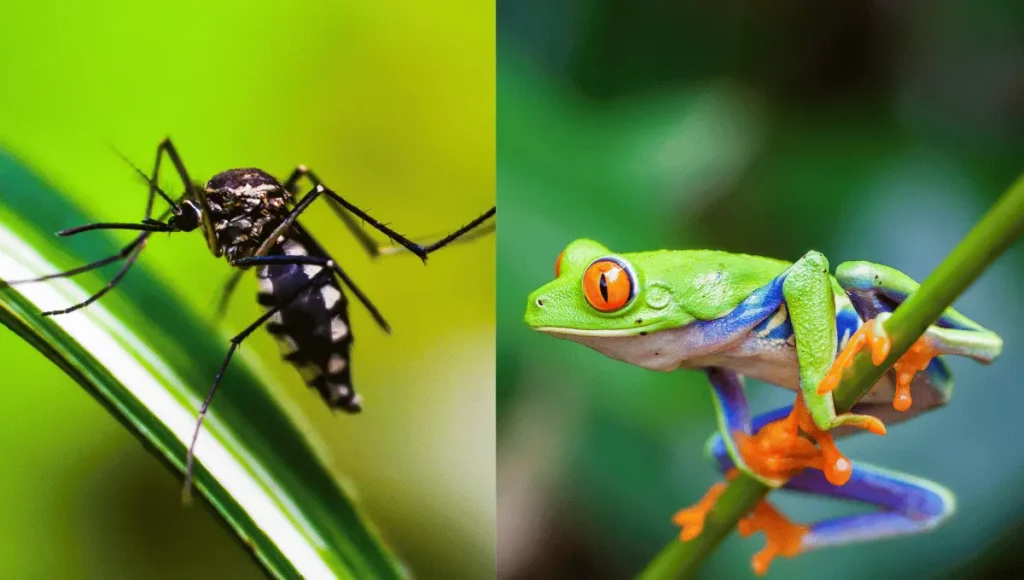
Green Tree Frogs and Their Habitat
Green tree frogs are commonly found in the southeastern United States and are easily recognizable by their bright green coloration. These frogs are insectivores and feed on a variety of small insects, including mosquitoes.
Green tree frogs are arboreal, meaning they spend most of their time in trees, which gives them access to a different range of mosquito species that may not be as accessible to ground-dwelling frogs.
Role of Green Tree Frogs in Mosquito Control
Green tree frogs are particularly adept at catching flying insects, making them effective mosquito predators.
They are also known to frequent areas near water, where mosquitoes are likely to breed, thus playing a role in controlling both adult mosquitoes and their larvae.
Their contribution to mosquito control makes them a valuable species in managing pest populations naturally.
Do Cuban Tree Frogs Eat Mosquitoes?
Cuban Tree Frogs as Invasive Predators
Cuban tree frogs are another species known for their appetite for insects, including mosquitoes. Native to Cuba, these frogs have become invasive in other parts of the Caribbean and southeastern United States.
Cuban tree frogs are large and have a voracious appetite, which allows them to consume a significant number of mosquitoes.
Benefits and Drawbacks of Cuban Tree Frogs
These frogs are often found near human habitation, where they can help control mosquito populations that pose a risk to human health.
However, like the coqui frog, Cuban tree frogs can have negative impacts on local ecosystems due to their invasive nature.
Despite this, their role in mosquito control is notable, particularly in urban and suburban environments where mosquitoes are a common problem.
Conclusion
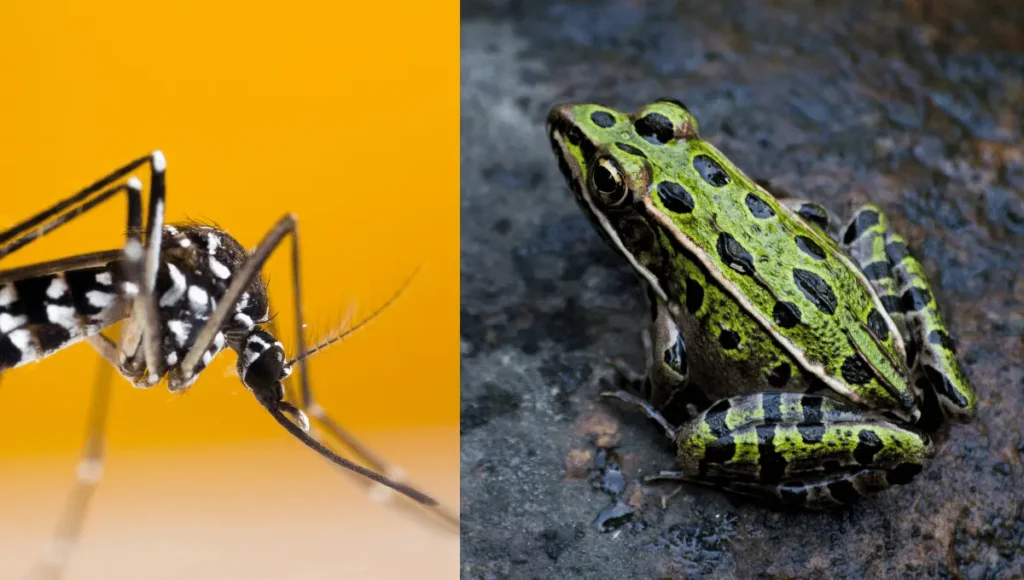
Frogs play a crucial role in controlling mosquito populations, acting as natural pest controllers in various ecosystems. While do frogs eat mosquitoes is a common question, the answer is a resounding yes.
Different species of frogs, including leopard frogs, green tree frogs, and Cuban tree frogs, contribute significantly to reducing mosquito numbers by preying on both adult mosquitoes and their larvae.
FAQs
Do all frogs eat mosquitoes?
Yes, most frogs eat mosquitoes, but the extent varies depending on the species and the availability of other prey.
How many mosquitoes can a frog eat in a day?
A single frog can eat hundreds of mosquitoes in a day, especially during times when mosquitoes are abundant.
Do frogs eat mosquito larvae?
Yes, many frogs, particularly those that live near water, will eat mosquito larvae as part of their diet.
Are mosquitoes a major part of a frog’s diet?
While mosquitoes are a common prey item for frogs, they are not the sole component of a frog’s diet. Frogs eat a variety of insects and other small creatures.
Can keeping frogs help reduce mosquito populations?
Yes, having frogs in your garden or local environment can help naturally reduce mosquito populations, as they feed on both adult mosquitoes and larvae.
I am Ismail Jam, and I have a great interest in frogs and toads. These amazing creatures are full of variety and play important roles in nature. I enjoy learning about them and their habitats as I travel and explore different places.
Pingback: Do Frogs Eat Spiders? Surprising Amphibian Diet Facts
Pingback: Why should you not eat toads - Frogs And Toads